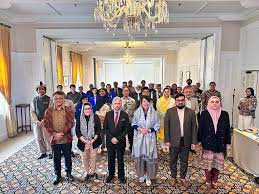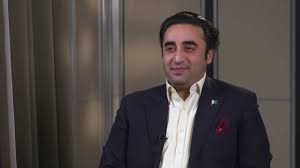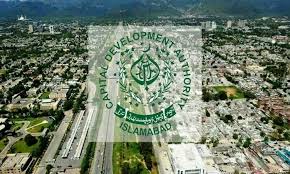Indonesian deputy foreign minister pledges support for interfaith dialogue with Pakistan

Jakarta: Indonesian Deputy Foreign Minister and Director General for Information and Public Diplomacy, Siti Nugraha Mauluddin, in a diplomatic exchange on Thursday, expressed her commitment to fostering religious inclusion and interfaith dialogue between Indonesia and Pakistan.

During discussions with a Pakistani delegation comprising scholars and intellectuals, she emphasized the fraternal bond between Indonesia and Pakistan as fellow Muslim nations. She underscored the potential for joint efforts in promoting peace in South and Southeast Asia, with far-reaching positive impacts globally.
The deputy minister highlighted the substantial student exchange programmes between the two countries and expressed interest in organizing a trilateral dialogue involving Pakistan, Afghanistan, and Indonesia. Leading the Pakistani delegation, Chairman of the National Rahmatul-lil-Alameen Authority, Khurshid Ahmad Nadeem, affirmed Pakistan’s unwavering commitment to interfaith harmony and dialogue. He acknowledged the significant contribution of Pakistani religious scholars to Islamic and Quranic sciences, facilitating the global dissemination of the true message of divine command. He also mentioned the educational ties between Indonesia and Pakistan, citing Indonesian students studying at Jamia Binnoria, Karachi, led by Mufti Nauman Naeem, who was part of the diplomatic visit. In a one-on-one session titled ‘Enhancing Religious Moderation and Interfaith Dialogue,’ Siti elaborated on Indonesia’s unique diversity, with a population of 280 million, making it the world’s third-largest democracy. She highlighted Indonesia’s successful management of its diverse society through the principles of moderation and acceptance called ‘Panchashila,’ derived from Islam and forming the foundation of the country.
The Pakistani delegation commended Indonesia’s efforts in presenting a model of religious moderation and shared experiences of Pakistani religious scholars contributing to Islamic and Quranic sciences. Acknowledging existing sectarian aspects, the delegation expressed optimism that shared platforms and enhanced dialogues could overcome such challenges. Dr. Farkhanda Zia presented Pakistan’s national narrative of peace and reconciliation, titled “Dukhtaran-e-Pakistan,” during the session. The delegation extended gratitude to the Indonesian Ministry of Foreign Affairs and the International Research Council for Religious Affairs (IRCRA) for organizing this impactful dialogue and trip.
The diverse delegation included individuals Muhammad Israr, President of IRCRA; Maulana Muhammad Tayyib Tahiri, Head of Jamat e Ishaat wa Tauheed; Barrister Zafarullah Khan, Politician and Writer/Author; Mufti Nouman Naeem, Head of Jamia Binnoria, Karachi; Maulana Rashid ul Haq Sami, Deputy Vice Chancellor of Darul Uloom Haqqania, Akora Khattak; Senator Barrister Muhammad Ali Khan Saif; Beenish Irfan Khan, Social Activist; Malik Habib Orakzai, Chairman of the Pakistan International Human Rights Organization; Mujtaba Muhammad Rathore, Freelance Journalist; Muhammad Ismail Khan, Political Analyst and Policy Expert; Farkhanda Mansoor Zia, Seasoned Academician; Ejaz-ur-Rehman, Socialist; and Syed Rashad A. S. Bukhari, Director of Communication and Development at IRCRA.





